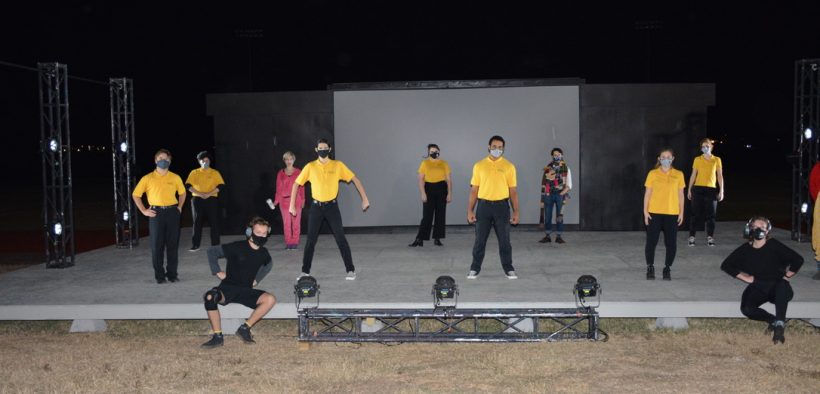Everybody Play Review
Share

Under a sky full of stars Southwestern students, faculty, and members of the Georgetown community alike gathered to watch the Sarofim Theater’s thought provoking production, Everybody. (written by Brandon Jenkins). Everybody is a modern adaptation of a European play from the middle ages that breaks the fourth wall to pose existential questions to the audience. Play goers were invited to bring a lawn chair or blanket to view the minimalist stage by the baseball field. The giddy audience members were contained in socially distant, blanket sized boxes which had been spray painted onto the yellowed grass. Although I assume other people were also ticked off by the sticker burrs and the occasional freezing gusts of wind– the energy of the crowd was optimistic. There was an aura of gratitude for the much needed social outing.
Everybody has personified characters: ‘Death’, ‘Things’, ‘Money’, and ‘Love’. Along with genderless, nameless cast members referred to collectively as ‘Somebodies’. Death, who was dressed as a goth Mary Poppins, came and told the yellow shirted ‘Somebodies’ that they were going to die. Upon meeting their creator, the ‘Somebodies’ were expected to give a presentation about how they spent their time on earth. The entire play took place in a whirlwind of an unnamed purgatory, the Somebodies in desperate search for the defining aspects of their lives. I interpret naming the newly dead “Somebodies” as articulating the pointless aspects of identity in a humbling way. One day, your name will only be an inscription on a gravestone, and your material possessions will have slipped from your ghostly grip.
Everybody comments on heavy topics without making it feel too heavy. Comic relief is adequately used to make complex existentialist themes digestible. Although this is coming from someone with a dark sense of humor, I feel comedic relief was equally provided for those with a preference for lighter, more “punny” jokes. The character ‘Things’ was hilarious, the packrat style costume truly spoke to the materialism that resides within us all. ‘Things’ was obnoxiously bitchy in the best way, reminding “Everybody” to loosen our grip on our worldly possessions.
Adam Kral, who at different times, played the characters: Usher, God, and Understanding, felt the outdoor performance connected him to the play’s medieval origins. He explains that:
“In the middle ages [the era the play was originally written], they would have [had] traveling wagons with stages on top of them, and the actors would perform outside going from town to town. In a way, [the] performance outside is kind of emulating that feeling, that idea of being connected with nature, and theatre being the medium between the audience members and being outside.”
Adam found Everybody incredibly engaging, and really admires playwright Brandon Jenkins’ ability to modernize a play from the middle ages in such an entertaining way. Everybody creatively utilized modern technology by incorporating pre-recorded acting segments in Zoom call format. This element of modernization was well done and connected the performance to our present pandemic era. Most of the play’s emotional dialogue took place on these mock Zoom calls, allowing the audience to see facial expressions. The actors on stage were always masked, so these recorded segments allowed for better emotional reception between actor and audience.
Cayden Couchman who played one of the ‘Somebodies’ summed the play up well:
“Everybody is a great conversation starter and vicious brain twister. The show makes you reconsider what you know about life and death and existence itself. The only things you can take with you when you die are love and your evil deeds.”
Overall, I immensely enjoyed the play and wished I could have watched it twice! Everybody provides thought provoking answers to life’s biggest questions in an entertaining and palatable way. The existentialist themes were in no way dumbed down to play it safe. When the show ended I had to sit in silence for a few minutes to absorb what I had seen. Viewing the play was not a passive experience– it required intense intellectual engagement on the audience’s part. The performance inspired a healthy reprioritization of the many motivations pulling us away from the present moment.
